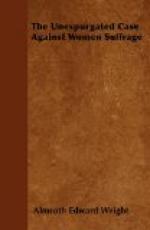An idealist of this type will, like Tolstoy, be an anti-militarist. He will advocate a general gaol delivery for criminals. He will be a vegetarian. He will not allow an animal’s life to be taken in his house, though the mice scamper over his floors. And he will, consistently with his conviction that it is immoral to resort to force, refuse to take any part in legislation or government.
This attitude, which is that commended by the Hindoo and the Buddhist religions, is, of course, a quite unpractical attitude towards life. It is, in fact, a self-destructive attitude, unless a man’s fellow-citizens are prepared by forcible means to secure to him the enjoyment of the work of his hands or of his inherited property, or unless those who refuse to desist from the exercise of force are prepared to untake the support of idealists.
We have not only these two classes of men—the ordinary man who has no compunction in resorting to force when the requirements of life demand it, and the idealist who refuses to have any lot or part in violence; there is also a hybrid. This male hybrid will descant on the general iniquity of violence, and then not only connive at those forms of violence which minister to his personal comforts, but also make a virtue of trying to abate by legal violence some particular form of physical suffering which happens to offend in a quite special manner his individual sensibility.
There is absolutely nothing to be said about this kind of reforming crank, except only that anything which may be said in relation to the female legislative reformer may be appositely said of him; and perhaps also this, that the ordinary man holds him both in intellectual and in moral contempt, and is resolved not to allow him to do any really serious injury to the community.
To become formidable this quasi-male person must, as he recognises, ally himself with the female legislative reformer.
Passing on to deal with her, it imports us first to realise that while the male voter has—except where important constitutional issues were in question—been accustomed to leave actual legislation to the expert, the female reformer gives notice beforehand that she will, as soon as ever she gets the suffrage, insist on pressing forward by her vote her reforming schemes.
What would result from the ordinary voter legislating on matters which require expert knowledge will be plain to every one who will consider the evolution of law.
There stand over against each other here, as an example and a warning, the Roman Law, which was the creation of legal experts: the praetor and the jurisconsult; and the legal system of the Greeks, which was the creation of a popular assembly—and it was a popular assembly which was quite ideally intelligent.
Upon the Roman Law has been built the law of the greater part of the civilised world. The Greek is a by-word for inconsequence.




